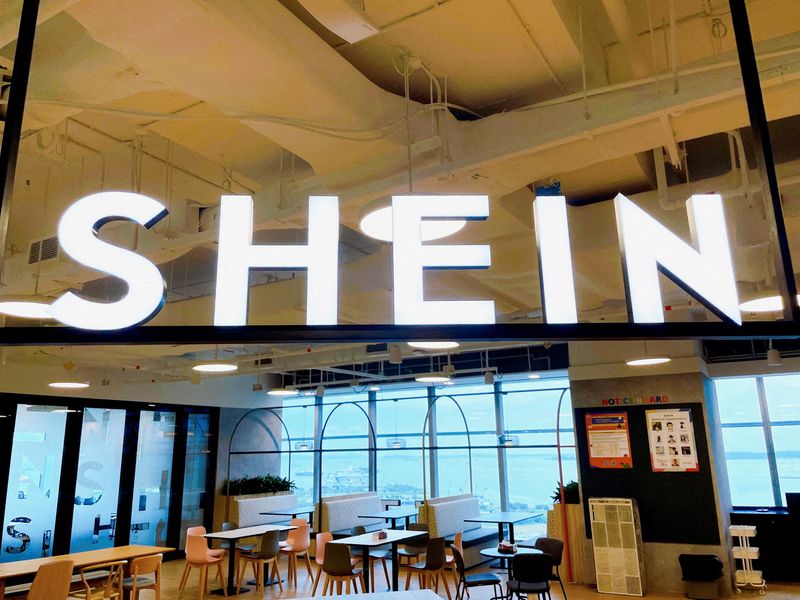By Katherine Masters and Arriana McLymore
NEW YORK (Reuters) -As China-founded e-commerce behemoth Shein moves to list in New York, U.S. lawmakers are again calling on it to prove that forced labor is not used to make its $5 T-shirts and $10 sweaters.
Shein confidentially filed for an initial public offering on Monday and could launch sales of its shares some time in 2024. The Singapore-based company has not determined the size of the deal or the valuation at IPO. Bloomberg reported earlier this month that it targeted up to $90 billion in the float.
Founded in 2012, Shein has been eyeing a U.S. IPO for at least three years but has been deterred by headwinds that included tensions between Beijing and Washington.
The online fast-fashion retailer, which manufactures most of its merchandise in China, faces criticism that Uyghur forced labor is used to make its low-priced apparel and home goods.
Critics are concerned that Shein may use contract manufacturers in China’s Xinjiang region, where advocates and governments have accused China of interning Uyghurs and other largely Muslim minority groups. Beijing denies any abuses.
Convincing regulators that its supply chain is clean will likely be a major regulatory hurdle as Shein works to convince the U.S. Securities and Exchange Commission that its shares should be traded publicly.
“If the fast-fashion giant Shein wants to go public in the U.S., they should have to prove to American consumers that their products are not sourced from forced labor,” Democratic Representative Jennifer Wexton said in a statement on Tuesday.
Earlier this year, the congresswoman led a bipartisan call for the SEC to halt Shein’s IPO until it verifies that the company does not use forced labor within its supply chain.
A separate group of Republican attorneys general from 16 U.S. states has also asked the SEC to audit the company, and Shein has been investigated by two separate Congressional committees over its sourcing and use of a trade loophole that allows most of its products to enter the U.S. duty-free.
Shein did not immediately respond to a request for comment, but the company has previously told Reuters it has “zero tolerance for forced labor” and has no contract manufacturers in Xinjiang.
A spokesperson for the SEC said the agency does not comment on any individual entity’s filings.
Megan Penick, a public securities lawyer at Michelman & Robinson, said it is unlikely to see a “direct block” from the SEC, but the agency could make the process difficult for Shein by making “the disclosure requirements so detailed, and, perhaps extreme, that it makes it seem … trying to go public cannot be achieved.”
“There may be issues with the forced labor allegations and the IP (intellectual property) issues that may make it hard for (Shein) to be able to answer the questions to the satisfaction of the SEC,” Penick said.
LOBBYING CAPITOL HILL
Public disclosures show that Shein has spent $1.28 million on Capitol Hill lobbying this year as it prepares to go public.
The company has also met privately with lawmakers, including some of its biggest critics, in an effort to shift its reputation in Washington, according to several Congressional aides.
One source familiar with the matter said that representatives for Shein emphasized the retailer’s efforts to diversify its supply chain from China to other countries, including India.
Shein also touted its efforts to bring more China-made goods to the U.S. in bulk on traditional container ships, which requires paying tariffs on those items.
“Shein is fundamentally a Chinese company and investors should approach Chinese offerings with extreme caution. Its attempt to go public should prompt a closer look at its business practices, especially its links to slave labor and its evasion of U.S. customs laws,” Republican Sen. Marco Rubio told Reuters.
“I will closely monitor Shein’s disclosures in the lead-up to its IPO,” added Rubio, who in June criticized the retailer’s lobbying efforts in a letter distributed to other senators.
Republican Representative Chris Smith, chairman of the Congressional-Executive Commission on China, has also criticized Shein’s lobbying efforts.
“Any investor in this company should be wary of the material risks involved in Shein’s business model … particularly as Congress is demanding an end to forced labor and closure of import subsidies for Chinese companies,” Congressman Smith said.
INCREASED SCRUTINY
In its most recent social impact report, Shein highlighted its partnership with Oritain, a company also used by the U.S. government to test cotton for links to China’s Xinjiang region. Shein previously told Reuters that it tests samples from every third-party cotton mill the company works with, and that it conducted 2,111 tests between June 1, 2022 and July 11, 2023.
Critics, however, say that the testing does not adequately screen the millions of garments exported globally by Shein every year.
Public securities lawyer Penick said that the SEC’s handling of Shein’s IPO will be crucial for other e-commerce players including ByteDance’s TikTok and PDD Group’s Temu, which may consider going public in the U.S. in the future.
Shein’s IPO is “going to be raising issues (for the SEC) that may later be applied across the board to all China-based or China-related companies that are going public,” Penick said.
(Reporting by Katherine Masters and Arriana Mclymore; additional reporting by Michael MartinaEditing by Marguerita Choy)
